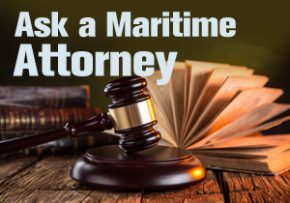Ask a Maritime Attorney: What is the protocol for buying an unregistered unfinished boat?
Question:
I am considering buying a 39-foot sailing yacht that was built from a kit on a vacant lot. The boat was never completed or put in the water, and it has been stored on private property since the death of the owner five years ago. The property was recently sold, and the new owners of the property would like to get rid of the boat to make room for the house that they plan to build. Unfortunately, no title paperwork appears to exist for the boat, I don’t think it has ever been documented or registered, and there is no hull identification number. Under these circumstances, can the property owners legally sell the boat to me? If I go forward with the purchase will I be able to document the boat with the Coast Guard once I’ve completed construction?
Answer
The purchase of an unfinished boat that has never been registered is similar to the purchase of any other type of unregistered personal property. If you buy a refrigerator at a garage sale you don’t really know whether the person selling the property has the right to sell it, so you look at as much of the surrounding information as you can, and you pull the trigger if you think it all looks ok.
For a boat, the biggest questions would involve how and why the boat is unregistered, and whether the circumstances of the sale are such that the person who is selling the boat appears to have a legitimate right to sell the boat. The most significant risks faced by a potential buyer would be that the person selling the boat is fraudulently in possession and therefore has no right to sell it; and that the real owner will show up some day and claim that the purchase should be voided. For the most part this is not a legal inquiry. It is instead a research project that the buyer must complete through investigation of the surrounding facts.
For our reader, the purchase seems pretty safe. With all due respect to our reader’s taste in boats, an unfinished 39 foot sailing yacht stored for 5 years in a cradle on a vacant lot will probably look like an abandoned derelict, in which case the seller’s story probably rings true. Conversely, a boat in pristine condition would not conform to the circumstances presented by the seller.
Our reader may also inspect the boat for evidence that it may have been previously registered. Federal regulations (46 C.F.R. §67.121) require the Official Number of a Coast Guard documented boat to be “permanently affixed to the vessel so that alteration, removal, or replacement would be obvious.”This usually involves engraving the number in the engine room or mounting a board on some structural part of the interior of the boat.
Assuming the circumstances of the sale are credible, the buyer will need to obtain a title for the boat. This process starts with the assignment of a hull identification number. Every boat sold in the United States must be assigned a unique HIN by the builder, even if the boat is built by a private party in a vacant lot. The HIN is a 12 digit number similar to the Vehicle Identification Number stamped onto the dashboard of a car. The number includes a three digit manufacturer’s identification code (MIC), followed by a serial number, the model year, and the month and year that the boat was manufactured.
Established boat builders have a unique MIC assigned by the Coast Guard, but the builder of a homemade boat must apply to the state boating agency for their home state. In California this responsibility falls on the Department of Motor Vehicles. The application process will include the preparation of a form (in California, DMV form BOAT 101), which asks for much of the information that is included on a Builder’s Certificate generated by a commercial boat builder. They are looking for a complete description of the boat, including the basic type of boat, the hull construction material, propulsion type, and the identity of the builder.
After processing the application, the DMV will issue a HIN and require it to be permanently affixed at two locations aboard the boat. The number will include a three digit MIC code that consists of the postal abbreviation for the state, followed by the letter “Z.” All home built boats that are first titled in California will therefore have a hull identification number that starts with “CAZ.”
People who consider the purchase of an unregistered home built boat will always face a certain amount of risk. The investigation process and the steps for creating a title can be complicated, and buyers should consider retaining an experienced maritime attorney to guide them through the process.
David Weil is licensed to practice law in the state of California and as such, some of the information provided in this column may not be applicable in a jurisdiction outside of California. Please note also that no two legal situations are alike, and it is impossible to provide accurate legal advice without knowing all the facts of a particular situation. Therefore, the information provided in this column should not be regarded as individual legal advice, and readers should not act upon this information without seeking the opinion of an attorney in their home state.
David Weil is the managing attorney at Weil & Associates (www.weilmaritime.com) in Seal Beach. He is certified as a Specialist in Admiralty and Maritime Law by the State Bar of California Board of Legal Specialization and a “Proctor in Admiralty” Member of the Maritime Law Association of the United States, an adjunct professor of Admiralty Law, and former legal counsel to the California Yacht Brokers Association. If you have a maritime law question for Weil, he can be contacted at 562-799-5508, through his website at www.weilmaritime.com, or via email at dweil@weilmaritime.com.


